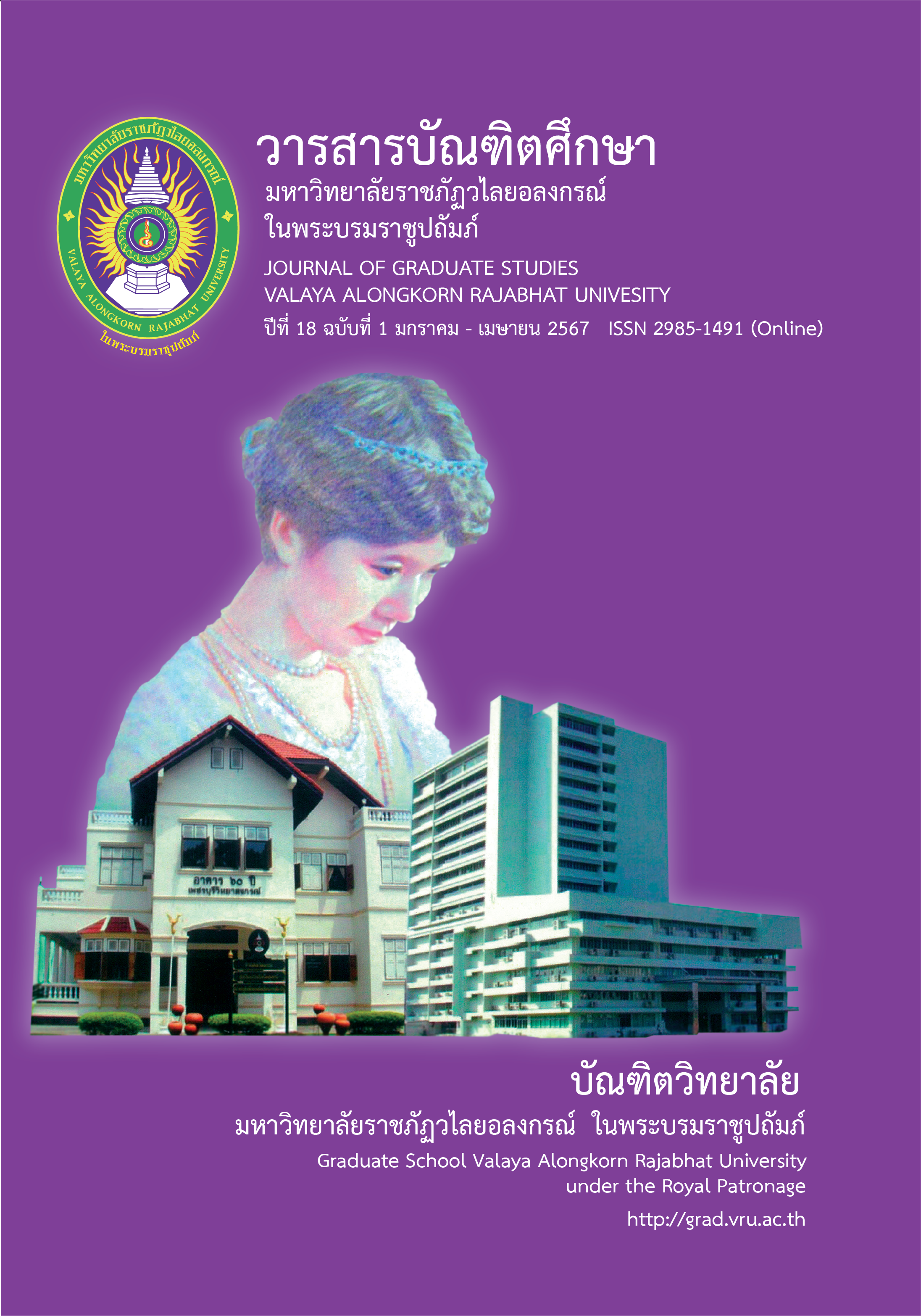A LEARNING NETWORK MANAGEMENT FOR THE DEVELOPMENT OF TRANSFORMATIVE LEADERS' POTENTIAL OF SAVING GROUP FOR PRODUCTION IN SONGKHLA
Main Article Content
Abstract
This research aimed to study factors supporting management, management processes and the results of learning network management for the development of transformative leaders of the savings group for production in Songkhla Province. The researchers employed a qualitative approach, case-study type, collecting data from related documents, in-depth interviewed from 12 key informants and participatory observation techniques.
The result revealed that: 1) Factors supporting the management of learning networks for the development of transformative leaders of the savings groups consist of (1) personal factors such as having potential and sacrifice, volunteer to represent the community in driving network activities, (2) budget factors, (3) location and space factors, and (4) activities factors. 2) The learning network management processes for transformative leadership development of the production savings groups consist of 5 main processes: (1) network structure, (2) job and role of staffs in network, (3) communication system, (4) organization of shared learning system, and (5) information system. And 3) the outcome of the learning network management processes for the development of transformative leaders of the production savings group can be classified in 3 levels: (1) the individual level : adjust the balance of thinking toward positive behavior change, (2) the family level : reduce expenses, increase income and have savings, living in sufficient life, and (3) The community level: influent to economic community changes, management of working capital of local communities that can create a society of sharing and lead to environmental management with a career in organic agriculture and applying the knowledge gained from joining the network being to balanced development.
Article Details

This work is licensed under a Creative Commons Attribution-NonCommercial-NoDerivatives 4.0 International License.
บทความทุกเรื่องได้รับการตรวจความถูกต้องทางวิชาการโดยผู้ทรงคุณวุฒิ ทรรศนะและข้อคิดเห็นในบทความ Journal of Global of Perspectives in Humanities and Social Sciences (J-GPHSS) มิใช่เป็นทรรศนะและความคิดของผู้จัดทำจึงมิใช่ความรับผิดชอบของบัณฑิตวิทยาลัย มหาวิทยาลัยราชภัฏวไลยอลงกรณ์ ในพระบรมราชูปถัมภ์ กองบรรณาธิการไม่สงวนสิทธิ์การคัดลอก แต่ให้อ้างอิงแหล่งที่มา
References
Bass, B. M. (1985). Leadership and Performance beyond Expectations. New York: Free Press.
Bass, B. M. & Riggio, R. E. (2006). Transformational leadership. Mahwah, NJ: Erlbaum.
Creswell, J. W. (2003). Research desaign: Qualitaive, quantitative,and Mixcd Methods approach. 2nd. Ed., Thousand Oaks: SAGE.
Chareonwongsak, K. (2000). kānčhatkān khrư̄akhāi: konlayut lak sū khwāmsamret khō̜ng kanpatirū kānsưksā [Network management: key strategies for the success of education reform]. Bangkok: Institute of Future Studies for Development.
Chantawanich, S. (2010). withīkān wičhai chœ̄ng khunnaphāp [A qualitative research method] 18th ed. Bangkok: Chulalongkorn University Press.
Chew, M. M., Cheng, J. & Petrovic-Lazarevic, S. (2006). Managers’ role in implementing organization change: case of the restaurant industry in Melbourne. Journal of Global Business and Technology. 2(1).
Dhammasaccakarn, W. and Ratchapolsit, A. (2018). phonlawat khō̜ng khrư̄akhāi klum ʻō̜m sap phư̄a kānphalit kap kānphatthanā khon læ chumchon yāng yangyư̄n [Dynamics of savings for production group network with people and sustainable communities’ development]. Journal of Social Work. 26(1), 34-62.
Department of Community Development. (2011). khwāmrū kāndamnœ̄n ngān klum ʻō̜m sap phư̄a kānphalit [Knowledge of the operation of the production savings group]. Bangkok: Office of Capital Development and Community Finance Organization.
Grisanaputi, W., Kunpalin, P., Inbueng, L., Yolai, N. and Wongchompu, T. (2017). kānphatthanā kānrīanrū talō̜t chīwit nai bō̜ribot khō̜ng lak thammāphibān khō̜ng klum sattrī nai khrōngkān kō̜ngthun phatthanā sattrī čhangwat Khō̜n Kǣn [Lifelong Learning Development in the Context of Good Governance Principles among Women Groups underWomen’s Development Fund Scheme, Khon Kaen Province]. Humanities & Social Sciences Journal. 34(3), 247-268.
Kaewhawong, T. (2001). krabūankān sāng khwāmkhēmkhæng khō̜ng chumchon phāk prachā sangkhom [Process of strengthening the community, civil society community]. Khon Kaen: Foundation to strengthen the community project. Public Health Academic Club Northeast.
Moser, A. & Korstjens, I. (2017). Series: practical guidance to qualitative research. Part 1: Introduction. European Journal of General Practice. 23(1). 271-273.
Phothisita, C. (2007). sāt læ sin hǣng kānwičhai chœ̄ng khunnaphāp [Science and Arts of Qualitative Research]. 3rd ed. Bangkok: Amarin. Printing and Publishing Public Company Limited.
Phongpis, S. (2005). khrư̄akhāi: yutthawithī samrap chumchon khemkhon chumchon khemkhæng [Network: Tactics for Concentrated community Strong community]. Bangkok: Charoenwit Publication.
Pholsri, S. (2007). khrư̄akhāi kānrīanrū ngān phatthanā chumchon [Network of learning in community development work]. 2nd ed. Bangkok: Odeon Store.
Power, B. & Hubbard, R. (1999). Becoming Teacher Researchers One Moment at a Time. Language Arts. 77(1), 34-39.
Ratchapolsit, A. (2017). phonlawat khrư̄akhāi klum ʻō̜m sap phư̄a kānphalit læ kāndamnœ̄n ngān talāt kānngœ̄n chumchon Songkhlā [Dynamics of Savings Groups for Production Network and the Operation of Songkhla Community Financial Markets]. A Thesis Graduate school Prince of Songkla University, Songkhla.
Robert, A. & Michael, M. (2001). Big Questions in Public Network Management Research. Journal of Public Administration Research and Theory. 11(3), 295-326.
Robbins, S. P. (2005). Organizational Behavior. 11th ed. Upper Saddle River, N.J.: Person.
Seufert, A. G. & Bach, A. (1999). Towards knowledge networking. Journal of Knowledge Management. 3(3), 180 – 190.
Tashakkori, A. & Teddlie, C. (1998). Mixed Methology. Combining qualitative and quantitative approaches. Thousand Oak, London: SAGE.


